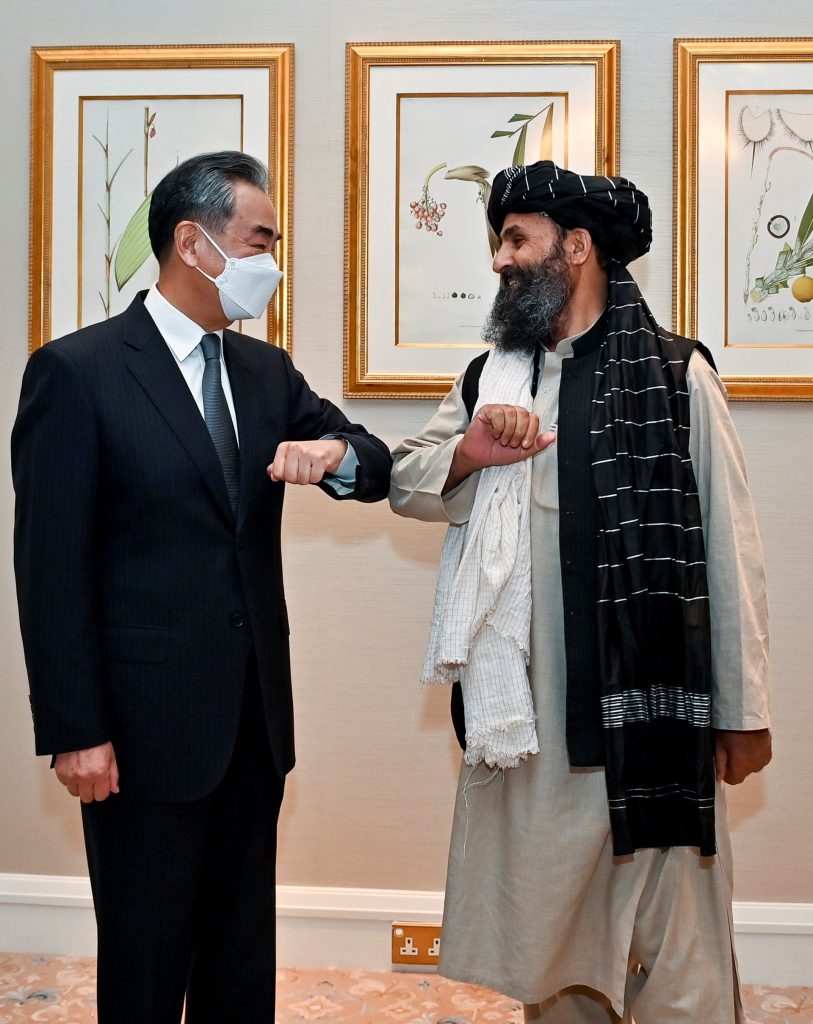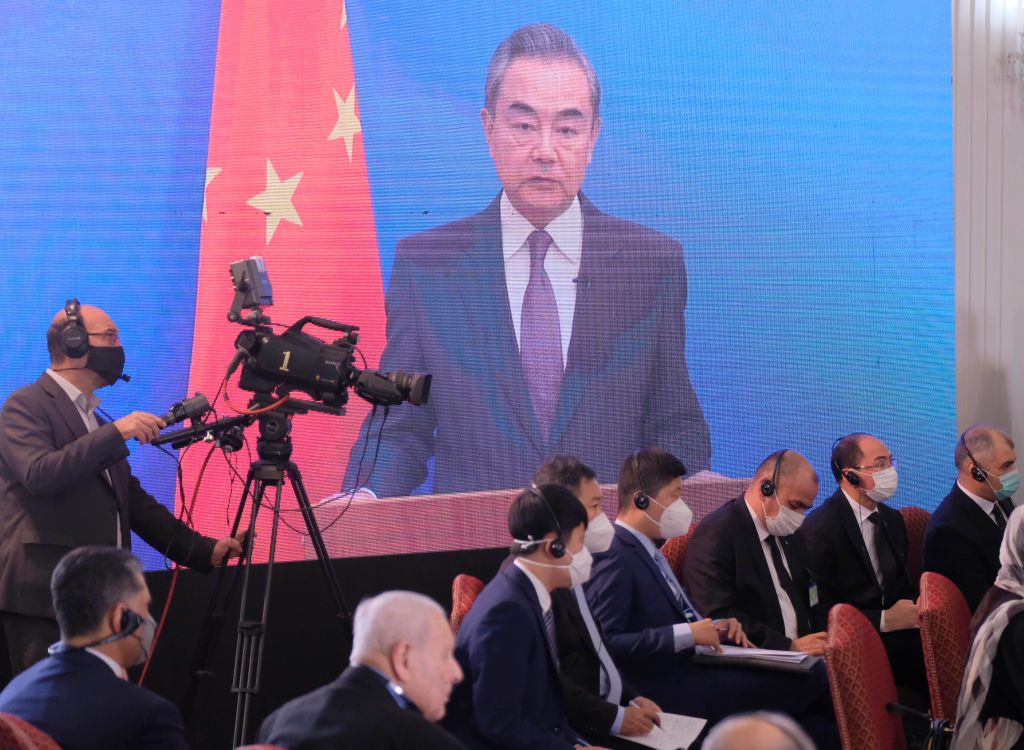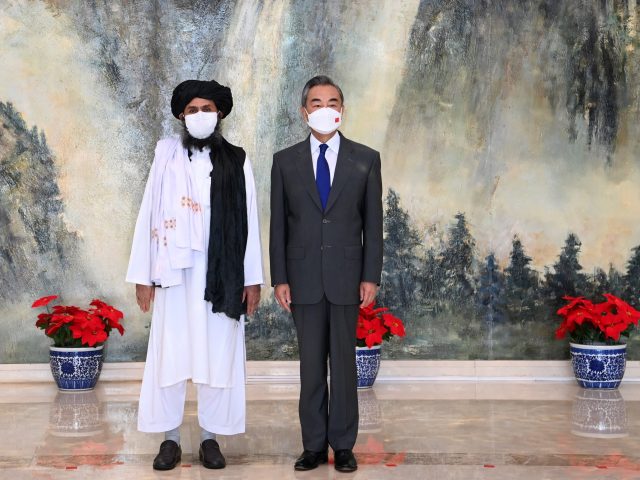China’s Ambassador to the Taliban Wang Yu announced on Tuesday that the Communist Party had invested $37.4 million in the success of the jihadist terrorist government since it took power in August.
China has been one of the most enthusiastic supporters of the return of the Taliban Sunni jihadist organization to power in neighboring Afghanistan, calling the August 2021 seizure of Kabul a “sunny day” for the world. While, like the rest of the world, China has not formally recognized the Taliban as the legal government of Afghanistan – accepting it only as an “interim” government entity – it has moved on to transparently treating the terrorists as such, revealing last month that a Taliban “ambassador” is stationed in Afghanistan’s embassy in Beijing.
The Chinese Communist Party has not expressed any meaningful concern regarding the Taliban’s terrorist activities despite using the alleged threat of jihad as an excuse to commit genocide against the majority-Muslim Uyghur people of occupied East Turkistan. The Taliban, despite claiming to be an Islamic organization, has also abstained from remarking on the Chinese-implemented genocide of Muslims on its border.
The Hong Kong-based South China Morning Post reported on Wednesday that China’s Ambassador to the Taliban Wang Yu boasted of a 250-million-yuan investment (about $37.4 million) in the Taliban during a meeting with a senior jihadist official. Wang did not clarify if that money included humanitarian aid funding in response to a June earthquake that killed over 1,000 people, as Chinese United Nations Ambassador Zhang Jun had already announced a 250-million-yuan investment on June 23.
“Wang said that after the change in government, China had announced it would provide 200 million yuan in emergency humanitarian aid to Afghanistan, and supplies had been entirely handed over to the country since the first delivery in September,” the Morning Post relayed. “China pledged another 50 million yuan in emergency humanitarian aid to the country after a strong earthquake struck southeastern Afghanistan last month, killing more than 1,000 people, injuring nearly 2,000 and leaving tens of thousands of people homeless.”
The earthquake in question occurred in late June, most severely affecting the impoverished Pakistani border provinces of Paktika and Khost.
Taliban “Deputy Minister of State for Disaster Management” Ghulam Ghaws Naseri, who attended the event alongside Wang, told reporters that about $8 million in Chinese assistance would be appropriated for earthquake disaster relief, according to Afghanistan’s Tolo News.
“The People’s Republic of China has provided more than 6,000 tons of rice worth eight million dollars to the people of Afghanistan in seven steps, and we have sent the aids to 34 provinces and the distribution process is ongoing,” the Afghan news station quoted Naseri as saying.
Both Naseri and Wang reportedly dedicated part of the press conference to condemning the United States. America engaged in a 20-year war against the Taliban that began after the September 11, 2001, jihadist attacks committed by al-Qaeda, a Sunni jihadist organization with close ties to the Taliban. The war ended in August after President Joe Biden broke an agreement that President Donald Trump had approved with the Taliban that would have seen American troops out of the country on May 1, 2021.
Biden extended the war and claimed he would withdraw troops in September. By August 15, the Taliban, having launched a national campaign to retake land from the American-backed government, had reached the Kabul city line, sending now-former President Ashraf Ghani fleeing.
While Taliban officials have insisted they want friendly ties to America and American foreign investment, the Chinese envoy went out of his way to blame America for all of Afghanistan’s current woes.
“The US military intervention in Afghanistan has brought deep disaster to Afghan people, and their irresponsible withdrawal has created more problems for Afghanistan which is the culprit of the current plight of Afghanistan,” Wang said at the event on Tuesday, according to Tolo News. “However the US not only ignored the disaster faced by the Afghan people, but also refused to return the assets of the Afghan people.”
The “assets” in question are Afghan government assets that the American government – as well as international institutions like the World Bank and IMF – have refused to give the Taliban as no state actor or the United Nations considers the Taliban the government of Afghanistan.

Chinese State Councillor and Foreign Minister Wang Yi meets with Mullah Abdul Ghani Baradar, political chief of Afghanistan’s Taliban, in China’s Tianjin, July 28, 2021. (Photo by Li Ran/Xinhua via Getty)
Wang did not address the fact that Biden’s government nearly immediately allocated $55 million in humanitarian aid to Afghanistan in the aftermath of the earthquake, significantly more than what China has contributed.
“The United States is the single largest humanitarian donor in Afghanistan, providing more than $774 million in humanitarian assistance in Afghanistan and for Afghans in the region since mid-August, including more than $573 million from USAID [the U.S. Agency for International Development],” a U.S. government statement noted on June 28. “USAID’s Disaster Assistance Response Team, based in the region to lead the humanitarian response in Afghanistan, continues to coordinate the U.S. response to the earthquake, and is supporting U.S. partners to ensure aid is reaching the most vulnerable.”
America’s contributions to aiding the impoverished Afghan people, who the U.N. has warned found themselves in a far more vulnerable state following the Taliban’s takeover, have done little to keep the jihadists from enthusiastically courting China. In August, shortly after seizing Kabul, Taliban representatives told reporters that they sought a close relationship with the communist regime.
“We are ready to exchange views with China on how to forge ahead in terms of boosting our mutual relations, establishing peace in the region, and its assistance in the reconstruction of Afghanistan,” Taliban spokesman Suhail Shaheen said at the time. “China, our great neighboring country, can have a constructive and positive role in the reconstruction of Afghanistan and also in the economic development and prosperity of the people of Afghanistan. It is expected [that] China [will] play its role.”

China’s State Councillor and Foreign Minister Wang Yi speaks during the Second Meeting of Foreign Ministers Afghanistan’s Neighboring Countries in Tehran Via video conferencing, October 27, 2021. (Photo by Morteza Nikoubazl/NurPhoto via Getty Images)
China, through its state media arms, transparently expressed an interest in working with the Taliban to exploit Afghanistan’s rich mineral resources.
“Rare-earth metals in Afghanistan were estimated to be worth anywhere between $1 trillion and $3 trillion in 2020,” the Global Times, a Chinese government propaganda outlet, reported in August. “China may ‘align itself with Taliban and try to exploit Afghanistan’s rare-earth metals,’ US media outlet CNBC reported on Tuesday, citing an investment analyst’s so-called ‘warning.’”
The Global Times did not challenge that expectation.
Rare-earth metals are pivotal for some of China’s most lucrative exports, including battery parts for high-end electronics and environmental “green” technology like electric vehicles.
Follow Frances Martel on Facebook and Twitter.

COMMENTS
Please let us know if you're having issues with commenting.